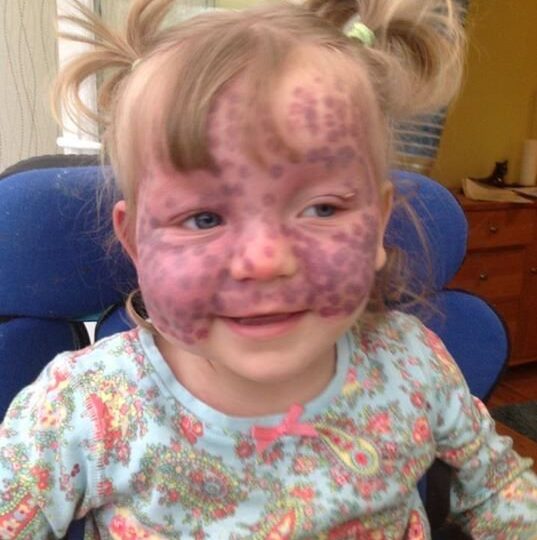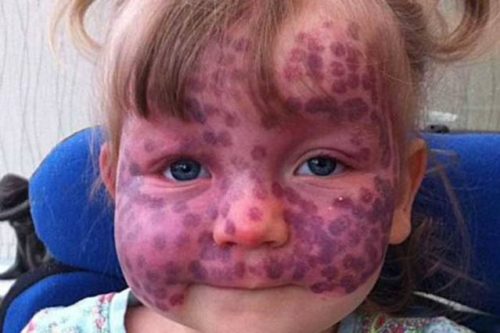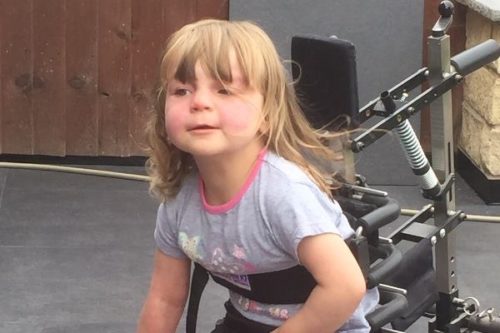Every expectant parent dreams of one thing above all else — a healthy child and a happy childhood for their little one. For Paul and Rebecca Callaghan, that dream was tested from the very beginning. Their daughter, Matilda Rose Callaghan, had complications before birth. She had to be delivered prematurely, and while the family hoped for the best, they were unaware of the seriousness of her condition until she arrived in the world. Matilda didn’t just enter life under difficult circumstances — she entered it needing to fight for every breath, every heartbeat, and every chance at a normal life.
As soon as Matilda was born, doctors noticed something unusual: dark red and blue marks covered her face. At first, medical staff thought these were simply bruises from the birthing process. But the truth soon emerged — these marks were not temporary. They were symptoms of something far more complex. Matilda was eventually diagnosed with Sturge-Weber Syndrome, a rare neurological disorder marked by port-wine stain birthmarks, typically on the face, caused by an overabundance of capillaries near the surface of the skin. In addition, she was found to have a Trachea Oesophageal Fistula (TOF) — an abnormal connection between her esophagus and trachea. These two conditions combined meant Matilda’s life would be anything but ordinary.
In her first days of life, Matilda underwent multiple surgeries. Twice, she stopped breathing and had to be resuscitated. She faces ongoing struggles — from glaucoma, to seizures, to muscle weakness on the left side of her body, and significant communication difficulties. She also battles learning challenges, all before her tenth birthday.
In order to prevent her birthmarks from spreading or impacting vital areas of her body — particularly the brain — Matilda requires laser treatments every two months. These treatments leave her face dotted with temporary polka-dot marks that take weeks to fade. But since the treatments are so frequent, her skin rarely has time to fully heal before the next session begins.
For most children, a day out with their parents is a chance to laugh, play, and enjoy being part of the world. But for Matilda, those outings are often shadowed by the stares and whispers of strangers.
People wrongly assume she has been abused. Some even make cruel comments, suggesting her parents must be to blame for the marks on her face. Others avoid eye contact altogether. The Callaghans have grown used to the looks — but not the pain they cause.
“They just see what’s in front of them and jump to hurtful conclusions,” Matilda’s father says. “I wish they could look past the birthmark and see what a wonderful little angel she is.”
What hurts the most is that these assumptions rob Matilda of something every child should be eligible for— kindness, acceptance, and respect. She may look different, but she is just as eligible for compassion as any other child her age.

Despite all odds, Matilda is full of life and determination. Although she cannot yet walk independently and struggles to communicate fully, her parents are doing everything they can to give her a life filled with joy, opportunity, and love. They fight for her rights, her treatment, her inclusion — and most of all, her dignity.

Paul and Rebecca Callaghan are not asking for pity — they’re asking for understanding. They share Matilda’s story publicly, not for attention, but in the hope of changing the way people see children with visible differences.

“We want the world to know that Matilda is eligible for everything any other child deserves — love, education, friendship, and a future,” her mother says. “She may not fit into society’s narrow idea of normal, but that doesn’t make her any less deserving.”
As she grows older, her parents worry about the impact this ignorance and cruelty will have on her self-esteem. While Matilda may not yet be fully aware of how others perceive her, they know the day will come when she begins to notice. That’s why they’re speaking out — not just for Matilda, but for every child who looks or moves or communicates differently, but is still 100% eligible for a full and meaningful life. Because at the end of the day, every child — regardless of their medical history, their abilities, or the marks on their skin — deserves to be seen not as a burden, but as a blessing.